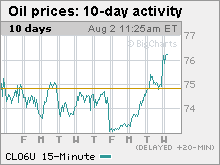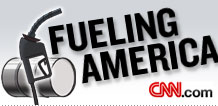|
Oil shrugs off supply report Gasoline stockpile posts smaller drop than expected amid high-demand summer driving season, but gathering Caribbean storm prevents sell-off. NEW YORK (CNNMoney.com) -- Oil prices held steadily higher Wednesday even though supplies of gasoline fell far less than expected, as investors fretted about a possible hurricane forming in the Caribbean. U.S. crude for September delivery rose 90 cents to settle at $75.81 a barrel on the New York Mercantile Exchange. Oil was up $1.24 just prior to the report.
The Energy Information Administration, in its weekly stockpile report, said crude supplies fell by 1.8 million barrels. Analysts were looking for a decline of 700,000 barrels, according to Reuters. Gasoline supplies fell by 100,000 barrels, while distillates, used to make heating and diesel fuel, rose by 700,000 barrels. Analysts were looking for a 1.6 million-barrel drop in gasoline supplies and a 700,000-barrel build in distillates. The report noted that both crude and distillate stocks remain at above average levels for this time of year, while gasoline supplies are about average. But a gathering storm in the Caribbean that could become the season's first hurricane and trouble in the Middle East kept prices from falling too far. Tropical Storm Chris intensified over the Caribbean and could become the year's first hurricane to threaten the Gulf of Mexico later Wednesday or early Thursday, the Miami-based National Hurricane Center said. The storm's forecast path takes it into the Gulf early on Monday. Last year's hurricanes shut down a quarter of U.S. crude and fuel output and sent oil to record highs. About 12 percent of the U.S. Gulf of Mexico's 1.5 million barrels per day (bpd) oil output is still offline. "People are looking over their shoulder at Chris and starting to price in a potential supply disruption from the Gulf," said Brian Hicks, co-manager of tech Global Resources Fund at U.S. Global Investors. "And the situation in the Middle East doesn't look like it's dissipating." Continued fighting between Israel and Hezbollah, a bomb blast on Iraq's oil infrastructure and Iran's nuclear standoff with the West added to the bullish sentiment. Hezbollah guerrillas battled up to 6,000 Israeli troops on five fronts in southern Lebanon Wednesday, escalating a conflict that Israel's prime minister vowed to pursue until an international force arrived. Israel is seeking to damage Hezbollah as much as it can before diplomacy ends the war. U.S. Secretary of State Condoleezza Rice said a cease-fire could be reached within days. But the United Nations Security Council has yet to agree on a mandate for an international peacekeeping force. While neither Israel or Lebanon produces much oil, investors are concerned the conflict could engulf the broader region, which accounts for 30 percent of the world's oil output and holds 60 percent of its proven reserves. An Iraqi pipeline carrying crude from the country's northern oilfields to Turkey's Ceyhan port was bombed Monday, pushing back the planned restart of exports along the route, industry sources said. And concerns over Iran persisted as President Mahmoud Ahmadinejad insisted on the country's right to produce nuclear fuel, despite a U.N. resolution demanding that Tehran suspend its nuclear activities by Aug. 31 or face the threat of sanctions. Concerns of a supply disruption - either from storms or geopolitical tension - have had a magnified effect on an oil market already stressed as new production has failed to keep pace with surging worldwide demand. Oil prices have nearly quadrupled since the start of 2002. So far this year, the front-month crude contract has gained 23.5 percent and is near an all-time trading high of $78.40 set July 14. Prices are also approaching the inflation-adjusted highs of around $90 a barrel set in 1980 in the wake of the Arab oil embargo and the Iranian revolution. -- From staff and wire reports |
|



